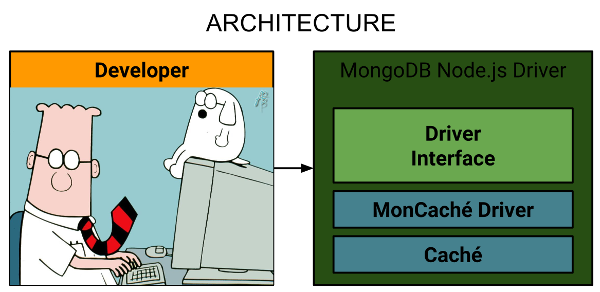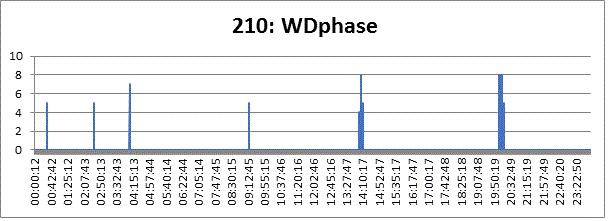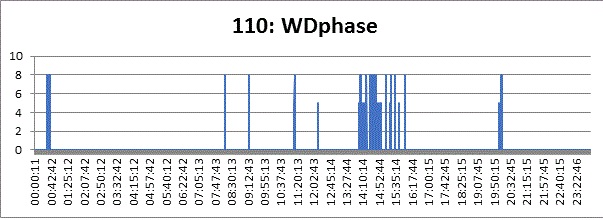Hello again! Welcome to the Part 2 - Handling payloads!
If you're new to this series, I'd recommend you to check out the Part 1 - Core concepts. You'll need a basic understanding about how Frontier works before continuing with the Part 2.
InterSystems Caché is a multi-model DBMS and application server. See more details here.
Hello again! Welcome to the Part 2 - Handling payloads!
If you're new to this series, I'd recommend you to check out the Part 1 - Core concepts. You'll need a basic understanding about how Frontier works before continuing with the Part 2.
hi world, i want to browse an sql table on cache, and get min ,max value from one collumn, how can i do it ?
thank's
Hi all.
I have been using a command pipe to open/run UNIX scripts for months without issue. We recently installed the 2016 Caché Upgrade and now I'm getting the following error when opening the pipe:
<PROTECT> *OPEN[Q](|CPIPE|)
I assume some security or permission setting is to blame, but I'm not sure exactly what. Here's the snippet of code...
s cpipename="|CPIPE|" s filepath="/path/script" o cpipename:(filepath:"R"):10
Any feedback would be greatly appreciated!
Hello.
The idea of this post is to introduce Frontier: An abstraction layer that allows Rapid REST development.
REQUIREMENTS:
Why?
Have you ever found yourself dealing with repetitive tasks like mounting objects, serializing them and eventually handling multiple errors for multiple cases? Frontier can boost your development by making you focus on what really matters: your application.
Frontier is made to stop you from WRITE'ing by instead forcing your methods to return values.
It's designed to make you code clean, and you'll see the why pretty soon.
This is the Part 1, where you'll learn he basics about how to work with Frontier. That means at the end of this part you should be capable of
creating GET requests without difficulties. Since this also serves as a way to introduce the framework, I'll be calling this part: Core concepts.
Our application has a SOAP service that is currently exposed via the built-in Apache server inside of Cache. I have configured the application to IIS instead so we can IP-Filter, however I no longer wish to have the management portal or other resources via the built-in Apache server. How can I disable the built-in Apache server so internal resources no longer reply on that server and are instead routed via the IIS site?
I also want the management portal option via the right click on the cube to be pointed towards the IIS URL rather than the old Apache instance with a port number.
Thanks in
Hello guys,
I was wondering whether there is another alternative to extracting a certain string out from a bigger one, rather than using the function $piece.
Maybe regular expressions? Another specific function?
Example:
Big string:
NAD+SLA+++TextIsHereNAD+SLA+++TextIsHere
String I want to extract:
TextIsHere
Function I'm already using:
w $piece("NAD+SLA+++TextIsHereNAD+SLA+++TextIsHere","NAD+SLA+++",2) > Will ouput TextIsHere
w $piece("NAD+SLA+++TextIsHereNAD+SLA+++TextIsHere","NAD+SLA+++",3) > Will ouput TextIsHereThanks!
Hi I am trying to tie all terminal logins in Cache so that rather than the user being presented with the Cache login and password the user is presented with my custom login page.
I can do this via a generic user so that once the generic user logs in they are presented with my Cache login page however is there a way to do this so that I can bypass the below login page and go straight to my login?
Node: myserver, Instance: CACHE
Username:
Password:
Thanks in advance
Jon
Cache 2016.2.1
the system offers $LISTNEXT as a way of looping in $LISTs and the documentation says this is much more efficeint than writing
for i=1:1:$LISTLENGTH(myList) { set value = $LIST (myList,i) }I want to walk backwards in the list,
is there a $LISTPREVIOUS or do I have to use the followng syntax to achie
for i=1:-1:$LISTLENGTH(myList)kevin
Hi guys
Im trying to use an API running in AWS API Gateway.
This API is over https and i am using the SSL/TLS config of Caché.
set httpRequest = ##class(%Net.HttpRequest).%New()
set httpRequest.Server = server
set httpRequest.Https=1
set httpRequest.SSLConfiguration = "SSLPadraoAdapcon"
do httpRequest.SetHeader("Content-Type","application/json")
do httpRequest.EntityBody.Write(json)
do httpRequest.Post("/dev/router")But im getting this error:
| SSLConfiguration = "SSLPadraoAdapcon" | SSLError = "SSL/TLS error in SSL_connect(), SSL_ERROR_SSL: protocolerror, error:14077410:SSL
So you have a namespace with thousands of .INT files and you want to identify routines that have not been executed in say the last 5 years. How would you do that without amending any existing software?
In which global cache class codes are storing in cache DB?
For example, Routine codes are storing in ^ROUTINE global.
situation: Need to read line by line and need to replace one string to another string in class files(.cls file) using programming.
Need to replace Property type in class files using programming i mean via programming to edit the class files
MonCaché — MongoDB API implementation based on InterSystems Caché

The idea of the project is to implement basic MongoDB (v2.4.9) API features for searching, saving, updating and deleting documents in a way that will allow the use of InterSystems Caché instead of MongoDB without changing the code on the client side.
Perhaps, if we take an interface based on MongoDB and use InterSystems Caché for data storage, we may see a performance boost.
Hi
I tried to access one server to another server in Cache Rest Service, I tried
Parameter HandleCorsRequest = 1;
and
<Route Url="/data/:first/:second" Method="GET" Call="GetData" Cors="true"/>
But not working,
Can anyone tell me the solution??
Thanks in advance!!
I have an xml file that it send over a SOAP client. The following is the soap log.
How do I get rid of the namespace "s0:" from the SOAP Body
......

Have you noticed that what ever the model and data structure in databases we cannot escape from the fundamental principle of managing data allocation space with references, i.e. pointer based logic, memory addressing ?Isn’t this the fundamental mechanism of programming languages too ?The problem I see with all these modern NoSQL databases, especially graph databases is that they provide a higher level abstraction for the end developer but they hide and lock completely the access to the low level storage and retrieval mechanism including indexes.
I'm looking at adding multilingual support to a couple of open source projects I'm working on. The solutions are already developed in CSP so I am not looking for alternative approaches.
I'm wondering what would be the best approach for CSP and separate JavaScript files.
Initially I was wondering if I should bake the default system language text at compile time, or provide the end user with a language selection option at run time.
I came across $$$TEXT reading the docs...
https://docs.intersystems.com/latest/csp/docbook/DocBook.UI.Page.cls?KE…
and have also discovered the
When I add a parameter to dataCombo for loading it on runtime and the property editable set to 0, dynamically loading content for dropdown through parameter works fine.
But, when I set editable to 1, to implement user search in dataCombo, loading through parameter is not working, it is loaded all rows, but I need loading on some parameter. It don't see the parameter, when editable is 1.
Is it normal behavior of dataCombo? But how about user search in dataCombo on this case? When editable is 0, we can't enter any character in dataCombo.
Hi world, i work actually on an intersystems project , my question is :
i've my Rest class that receive an HTTP request from a client side , i want to know how extract data from this http request , for example : date , id_client and measures taken by the client ( i need to extract a weight value catched from a connected scale to my smart phone via bluetooth ) .
Thank you
Hi,
I would like to draw your attention on a recently published article, titled "A Quick Guide on How to Prevail in the Graph Database Arena", that has been posted also at LinkedIn. Intersystems Caché has been referenced several times. In the "Multi-model Database Engine" section of this article, there is a quick description of Caché as an
object database with relational access, integrated support for JSON documents and a multidimensional key-value storage mechanism that can be easily extended to cover Graph data model
I believe strongly that Intersystems Caché is an exceptional database
Hi,
I am experimenting with Cache-Python binding. In the following piece of Python code
import intersys.pythonbind3
conn = intersys.pythonbind3.connection( )
conn.connect_now('localhost[1972]:SAMPLES', '_SYSTEM', '123', None)
samplesDB = intersys.pythonbind3.database(conn)
p10 = samplesDB.openid("Sample.Person",'10',-1,-1)
p10.run_obj_method("PrintPerson",[])
I am opening the 10th record of Sample.Person class and then I am calling an object method (PrintPerson).
Method PrintPerson()
{
Write !, "Name: ", ..Name
Quit
}
How can I redirect the output of Write command so that Person's name is
a.k.a.. "The World of Widgets Returns!" or "Paternity leave damages Instructional Series momentum"
In our last lesson, we combined 2 separate classes to appear as the same property. We now have the ability to Update our Widget catalog, but what if we want to Create a Widget? Thankfully, we've already done 90% of what we need, just by implementing Edits
As we mentioned when creating the REST Services for PUT and POST, the only real difference between creating and updating a record is whether we are passing in an existing ID or creating a %New record.
My scenario is:
I have a Cache method that
call a REST -> JSON -response > INSERT/UPDATE the source table of a DeepSee Cube -> Update the Cube only for this change -
I want to view in .NET Application the changes. For that I want that this method should be executed at a defined interval.
Or maybe the solution is a Refresh button in .NET page. is there any way to access a Cache method from .NET?
Any idea how to do it?
I have a <tablePane> element with OnCreateResultSet and OnExecuteResultSet methods; autoExecute is "false" but the OnCreateResultSet and OnExecuteResultSet methods are nevertheless called on page load.
I want the user to be able to press a button to submit the parameters, then have this button call tablePane.executeQuery() to execute the query.
autoExecute is simply igonored. We're on 2014.1.3 with plans to upgrade to 2016 soon.
Are there more settings I need to set? Or is this attribute simply ignored?
<tablePane id="tblReport" useSnapshot="true" autoExecute="false"OnCreateResultSet="CreateRS
Caché Version String: Cache for UNIX (Red Hat Enterprise Linux for x86-64) 2016.2.1
We have a mirrored Ensemble system (110, backup and 210, primary). At one time (14:00) there is a disruption in the production. The messages are not being processed.
Looking at the pButtons (every 10 seconds) I see the following abnormal at the WDphase

and the backup

The different values of WDphase are:
0: Idle (WD is not running)
5: WD is updating the Write Image Journal (WIJ) file.
7: WD is committing WIJ and Journal.
8: Databases are being updated.
Can anyone explain what the different phase of the write daemon
Twilio is a great tool for programmatically initiating and managing phone calls. In this example we'll go over basic account setup, create a Cache Class to manage our interaction with the Twilio API, and initiate a phone call from the Cache Terminal.
The full Class used in this example is available on GitHub as well.
This 'feature' have been around for a long time, but I don't see any articles on it so I thought I would make everyone aware.
A method is provided to customize the appearance of the Cache cube icon in the system tray so different instances can be visually distinguished. When csystray.exe, the Cache/Ensemble cube program, starts, it will look for files named "up.ico" and "down.ico" in the \bin directory below the instance installation directory. If these .ico files are present, csystray.exe will load the icons and display them in place of the default blue and gray Cache/Ensemble cube icons.
Hi,
I'm developing an integration between Caché servers by ODBC conection, and I have the following problem.
In this call:
call COSClass_Methode('222169^^98^155^64530^06:30^021542987897458855441112877855^1^0^281992^GC')
the ODBC driver is truncating the string to 50 characters.
If I run this same command with $system.SQL.Shell(), this doesn't occur.
I did a test creating several parameters for COSClass_Methode, and they all have a 50 character limitation.
Does anyone know why the ODBC Cache Driver limits the number of characters per parameter of this type of call?
Or, how can I adjust this?
Example of
 XDATA is used for a whole host of ISC libraries to store things like Zen pages, BPL logic and DTL transformations.
XDATA is used for a whole host of ISC libraries to store things like Zen pages, BPL logic and DTL transformations.
XDATA is the equivalent of XML config files of the JAVA world and JSON config files of the JavaScript / NPM world.
Whilst Atelier looks to shift source code to the disk, XDATA will remain a key component to source control our projects config / meta data.
I come across many developers who overlook XDATA, seeing it as an internal function of Cache and Ensemble and instead use globals to move meta data around, I've been there myself.
It might be because XDATA can feel a little clumsy to
How do we need to set a flag with quit command and what is it share some example?
Is it possible to execute a sql update statement from objectscript? This code isn't working for me.
Set tSQL = "UPDATE table Set Status = 'Completed' WHERE ID in (1,2,3,4)"
Set tStatement = ##class(%SQL.Statement).%New()
Set tSC = tStatement.%Prepare(tSQL)
If I write my dynamic sql to the event log, copy and execute it in the Management Portal, it works fine.